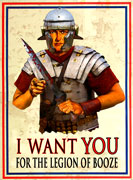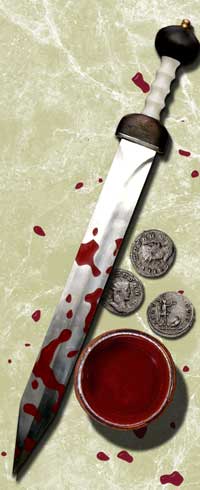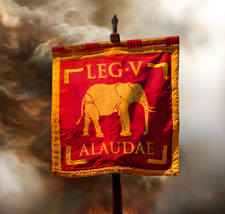The Fifth Legion is on the march.
They move at a fast trot beneath a beggar’s moon, gladius swords in hand, their armor rattling in ragged chorus. They are also quite drunk.
A half hour earlier their commander, an equally drunk Mark Antony, had charged through their camp atop his stallion, yelling about some brilliant plan he’d just cooked up while drinking in his tent. It was well past midnight and the legionnaires of the Fifth were huddled around their campfires, finishing off their daily ration of wine.
Not the usual three-liter ration of acetum. These particular men didn’t think much of that watery vinegar wine issued to the other legions. It was hard to guzzle the sour potation, and even harder to get loaded on the stuff. No, their daily ration consisted of five liters each of strong, locally-looted Greek vino.
Ever eager for battle, they heeded their commander’s call. Hastily donning their armor and gathering their weapons, they lurched into the night.
Antony had seized upon the idea that a sudden night assault on the Republican army camped nearby would make quick work of the Greek campaign. A noted drunkard with a serious impulse-control problem, Antony was famous for such spur-of-the-moment assaults.
The men of the Fifth crest a low rocky hill and gaze down upon a vast moonlit plain. Mirroring the starry skies above, the plain is speckled with a multitude of lights—the campfires of the Republican army. The Fifth’s centurions quickly spread the 5000 legionnaires into a line three ranks deep. The men catch their breath, a bit dizzy from the wine and the fast march. They wait, and they do not have to wait for long.
The terms of battle are quickly passed from cohort to cohort: “No quarter. Kill everyone.”
With a great shout from the centurions, the Fifth rush out of the night and into the camp roaring like demons unleashed from Hades, hacking and stabbing everyone they meet. The horrified Republican soldiers give out cries of surprise and try to flee, but the Fifth are moving too fast. It is grim and grisly work and before the sun rises on the gruesome scene the Fifth will have massacred 2,000 men while losing only a handful of their own.
It was just another day on the job. A brief stop on a long and bloody road that began four years before in the green hills of Gaul. For the men of Legio V Alaudae, the Fifth Roman Legion, were not Romans at all.
The Lost Boys From Gaul
The true Romans of the other legions called them “drunken barbarians” and the men of the Fifth probably thought they were being complimented. They were certainly barbarians—the legionnaires of the Fifth were Transalpine Gauls and hold the distinction of being the first legion composed entirely of non-Roman citizens. Julius Caesar raised the Fifth in 52 BC, filling its ranks with what he described as “the most noble and valiant young men” of Gaul. Noble and valiant they may well have been, but they were also bloodthirsty killers and ferocious drunkards.
 There’s little mystery as to why Caesar broke tradition and raised a foreign legion. After conquering much of Gaul, he had turned his ambitious eyes homeward. There was talk in the Senate of giving him the boot, of bringing him up on charges, which to Caesar seemed a rather shoddy way of treating a heroic general who had brought so much plunder and glory to Rome. Caesar knew he would have to deal with the Senate sooner or later and wanted at least one legion that would answer solely to him. Roman legions might switch sides during a civil war. A Gallic legion paid out of his own pocket, on the other hand, would be immune to such conflicts of conscience.
There’s little mystery as to why Caesar broke tradition and raised a foreign legion. After conquering much of Gaul, he had turned his ambitious eyes homeward. There was talk in the Senate of giving him the boot, of bringing him up on charges, which to Caesar seemed a rather shoddy way of treating a heroic general who had brought so much plunder and glory to Rome. Caesar knew he would have to deal with the Senate sooner or later and wanted at least one legion that would answer solely to him. Roman legions might switch sides during a civil war. A Gallic legion paid out of his own pocket, on the other hand, would be immune to such conflicts of conscience.
When Caesar finally decided to make his power grab, the Fifth had already spent two years under the Roman eagle, incessantly training and sometimes campaigning. They absorbed many fine lessons, especially how to fight as a disciplined and cohesive unit, a legion, as opposed to their traditional style of singular combat.
Caesar was less successful in teaching them the Roman way of drinking, which meant watering down the wine, drinking in moderation, and not running amok once you’d had your fill.
The Gauls considered the ability to drink prodigiously a mark of great honor and distinction. The Gallic culture at the time was centered on two things: fighting and drinking. Oftentimes they liked to combine the two. They thought watering down wine a ridiculous idea, and were possessed of the notion that if you had wine you should drink it all, immediately, and see where the night took you. The Gauls, Pliny noted, “drank beer and wine with such abandon one wonders if their tongues had time to tell their stomachs what was coming.”
The Fifth stood out in other ways. They liked to wear their helmet crests high, earning them their nickname Alaudae, a Latinized Gallic word for “crested lark.” Though most were still in their teens, they were taller than their Roman counterparts, and likely to be blue-eyed and fair-haired. They also worshipped different gods and fought for different reasons.
The Road to Rome
When Caesar cast his die and crossed the Rubicon with the Thirteenth Legion, the Fifth and sundry other legions were ordered to abandon their winter quarters in Gaul and join him on his Italian adventure. Some answered the call, others refused to participate in what they considered treason against the Roman Republic.
The Gauls of the Fifth could have easily bowed out of a civil war that had little to do with them and returned to their farms and forests. It wasn’t their fight.
Instead they decided to join Caesar. They had their reasons. There was none of that “Let’s kill them for the home team” kind of thing; they didn’t give a damn about the fortunes of Rome. Nor were they proper mercenaries: it was a 16-year hitch and they sure as hell weren’t going to get rich. Whatever few drachmas they pulled in were passed right along to the wine-sellers and whores who trailed the legions like skulking jackals. A small parcel of conquered foreign land was sometimes awarded to retired legionnaires, but they knew they were much more likely to end up in a mass grave near some anonymous battlefield than survive 16 years of brutal combat.
No, it was strictly a death and glory gig, a one-way ticket to Hell. Their sole mission was to get in as many kicks as possible before shacking up with Dis, their god of the underworld. They wanted adventure, glory and plunder. They wanted all the free wine they could get their hands on. For “plundered wine tastes all the sweeter,” as noted Linnus, a Roman scribe embedded with the Fifth.
Killing with Kindness
Upon arrival at the front, Caesar greeted the Fifth with a nifty speech. “Your hearts must become vast reservoirs of kindness and violence,” he told them. The violence part they no doubt understood, but kindness? What on earth for? Kindness just got in the way of all the fun.
Realize that this was the time of legion vs. legion. The best and most brutal killing machines on the planet turned upon one another. The Larks possessed combat experience, fighting other barbarians, but nothing like this. To their credit and growing reputation, the Fifth adapted quickly, using their peerless ferocity to overcome the superior training and discipline of veteran Republican legions. Caesar reveled in their natural viciousness on the battlefield. Afterwards, not so much.
In his journal Caesar confessed a paternal feeling toward the wayward barbarians of the Fifth, saying it was his “murderous sons from Hades” that he was bringing to bear upon his countrymen. For all his hyperbole, however, Caesar largely restrained the Larks from wreaking too much havoc, at least off the battlefield.
Much to the Fifth’s collective dismay, Caesar didn’t let them run amok in the manner to which they were accustomed. These conquered Romans were, if Caesar’s plans came to fruition, his future constituents, after all. When the Larks sacked a Roman town, Caesar forbade they satisfy their lust with his countrywomen or even raze the town to its foundations. He did, however, allow them to sample the local vintages.
They were not unacquainted with the product of the vine. Rome’s traders had preceded its legions and while these sons of Gaul preferred their native beer, they had an appreciation for Rome’s drink of choice. The wine undoubtedly got better as they neared the capital, but if there is any truth to Pliny’s earlier observation, they probably didn’t notice.
They had guzzled plenty in garrison, to be sure, but now that they were on the warpath, the Larks cranked up their game. Killing your fellow man is thirsty work, after all. Perhaps they drank to wash away the stain of horrific memories, collected day-to-day. Perhaps they drank to forget that they would never lay eyes on the green forests of Gaul again, and would most likely die like dogs in some alien land for reasons they barely understood. Perhaps, born and bred to war as they were, they drank in celebration of their grisly deeds. Or maybe they drank because they really liked to get loaded.
Regardless, they drank. There was none of that half-hearted “I have to get up early, march 20 miles and kill a bunch of guys tomorrow, so I have to take it easy tonight” nonsense. They all had that waiting for them, come dawn, so there was little tolerance for cheap excuses. Were they not Gauls, after all, known far and wide as the hardest-drinking barbarians of Europe? They had a reputation to live up to, and live up to it they did.
And when dawn did come, well, you can imagine the scene. You think waking up to a jangling phone with your boss on the other end makes for a nasty hangover? The Fifth’s centurions liberally employed whips and clubs to encourage their legionnaires to join the morning formation. Couple that with a nice 12-hour force march in the blazing sun with a bloody battle at the end of it and it’s not hard to understand why there was something called “marching wine.”
While strict with his other legions, Caesar gave the Fifth quite a lot of leeway. He knew their customs demanded a much larger ration of wine to keep them content, and issued the order that if they were willing to carry the extra amount, they could bring and drink it. They were willing to carry it.
Historians argue as to the source of Caesar’s generosity. He had little reason to doubt their loyalty—shortly after their creation, had they not served with great distinction at the Siege of Alesia, against their Gallic brothers? Gauls from hated rival tribes, to be sure, but Gauls nonetheless.
Despite this, one gets a sense from his journals that Caesar let the Larks get away with so much because he had a deep and abiding fear of the wild animal he had trained to kill on his behalf. Proper Romans possessed an innate allegiance to their generals and would accept harsh disciplinary measures, but these brutes, well, they might go berserk at any conceivable moment.
The Fifth’s reputation preceded it. As they drew nearer to Rome, the Larks need only show up at the gate and the town militia thought better of waving swords around. So long as they weren’t chintzy with the wine stores, no one need get hacked to death.
A Hellenic Holiday
The Fifth was not with Caesar when he marched unopposed into Rome. He probably thought it a bad idea. It was the Fifth’s Gallic forefathers, after all, who had sacked Rome back in 390 BC and some Romans were still sensitive about it. Instead, the Fifth were stationed in the southeastern region of Apulia, then ferried across the Adriatic to Greece in pursuit of Pompey, the wily commander of the Republican forces. There, as the beginning of this article attests, they largely served under Caesar’s go-to-guy Mark Antony.
The Larks liked Antony. He was a Roman after their own hearts, possessed with a proper taste for blood and wine. It also helped that Antony let them drink as much as they liked; the marches between sacked towns were described as “drunken revels.”
The Fifth ducked at least one bullet (or arrow, if you will) during the Greek campaign—at the battle of Dyrrhachium, Pompey had a very real chance of crushing Caesar’s vastly outnumbered forces, but let the opportunity slip away. While they had faced individual death on many occasions, this was the first time the Gauls got a look at group destruction, up close and personal.
Caesar would eventually smash Pompey’s legions at Pharsalus. The Fifth was busy elsewhere at the time, probably much to their consternation.
The Greek campaign complete, the Fifth returned to dreary Apulia. There they waited while Caesar dallied with Cleopatra in Egypt. Little is recorded as to what the Fifth got up to during this interlude, but we can guess. It’s known the locals didn’t care for them much, and who can blame them? Imagine living just down the road from a small army of wild-eyed country boys with blood under their fingernails and undisguised murder in their hearts.
Orders from Caesar finally arrived an excruciating year later. Seemed some diehard Republicans were building an army in Northern Africa and Caesar meant to remind them who was running the show now. The stir-crazy Fifth undoubtedly thought this was a perfectly brilliant idea.
 Have Sword, Will Travel
Have Sword, Will Travel
Things got off on the wrong foot almost immediately. There was a shortage of galleys, so the lads were forced to leave important provisions behind, like whores and wine. Caesar assured them there would be plenty of both once they knocked over a couple fat towns, and the Fifth took him at his word.
Upon arrival in what is now Tunisia, the Fifth joined in an elaborate dance between the opposing armies. Metellus Scipio led the Republican forces, and for weeks he and Caesar engaged in endless minor skirmishes, feints and counter-feints, everything short of actual battle. Caesar was big on entrenchments and the legionnaires were constantly digging trenches, raising redoubts and building forts, then abandoning them to dig and build elsewhere.
These were stratagems the Gallic mind found difficult to grasp—if they were to fight, why didn’t the generals draw up their men on a field and have at it?
It wasn’t long before the Fifth fell into a foul mood. Caesar was reluctant to siege the fortified cities, what with Scipio’s army prowling around the desert like a werewolf, waiting for them to turn their backs. What little wine the Larks had brought with them had run out about 15 minutes after they’d hit the beach. The only stuff they could lay their hands on was substandard at best—they were forced to swill a local shepherds’ brew called contus. It was flavored with pitch and tasted, according to Linnus, like something you might ladle from a prostitute’s commode. That was if there were any prostitutes around, and there weren’t. All the good wine and hookers were in the cities, which belonged to Scipio.
The dilly-dallying went on so long, the beleaguered boozers of the Fifth probably started to suspect that the entire campaign was merely an elaborate and cruel ruse designed to ween the boys off drinking.
So you can imagine the sheer jubilation the Larks must have felt when the two armies finally gathered to do battle outside the town of Thapsus. By this time a violent and honorable death must have seemed preferable to more weeks wandering around the desert with nothing but rotten tar wine to drink.
Men Vs. Monsters
The first thing Caesar noticed, with no small amount of alarm, was Scipio had placed 60 war elephants on his flanks. War elephants were the main battle tanks of their day; the very sight of them could infect soldiers with panic. A well-organized charge could scatter a line of infantry like so much chaff and put the entire army in rout.
As Caesar pondered his options, a strange thing happened. A tribune rushed into his tent and announced that the men of the Fifth demanded that they be positioned opposite the elephants. Caesar’s reaction, be it bemusement, consternation or admiration, was not recorded. Regardless, he granted their wish.
Imagine that moment. Picture those wayward sons of Gaul, so far from home, staring across that hot and dusty plain. To their right was the sea, to their left a vast salt lake, to their rear miles of scorched desert. And before them, for the love of Bacchus, was what appeared to be actual fucking monsters from Hell, all lined up and eager to annihilate them.
What could have inspired their bold, quite possibly suicidal demand? Did they feel they had something to prove to their commander? Did they fear the presence of the elephants would cause Caesar to withdraw, once again? Maybe, from a couple hundred yards away, the elephants didn’t look so big. At that distance they probably looked like fat cattle, and check it out—they’re surrounded by what appeared to be tiny children wearing armor! It’ll be cakewalk!
Or maybe it was what lay beyond the elephants, the rich city of Thapsus, fairly shimmering with wine and plunder, that inspired them.
Sadly, history is mute on the subject. We’ll never know if it was bravado, bloodlust or thirst that motivated the men of the Fifth, but face the elephants they did. And little did they know it, but this would be the battle that would chisel the Fifth’s name in military history.
Caesar began his customary stroll from legion to legion, exhorting the troops to greater glory. A talented orator, he was perhaps too successful. Whipped into a frenzy of bloodlust, the men begged their general to give the order to attack, right then and there. Caesar, typically, refused.
The Larks decided to start the party without him. They coerced a trumpeter into sounding the charge, then started toward the enemy line. The other legions joined in and, realizing he couldn’t stop the ball once it started rolling, Caesar jumped on his horse and galloped to the fore of the terrible wave.
Startled by the suddenness of the attack—it was so unlike Caesar—Scipio immediately ordered his elephants to charge, hoping to break the wave before it crashed into his main body of troops.
And so they came, all 60 of the goddamn beasts, trumpeting horribly, moving at full gallop, growing larger with each thundering step, 700,000 combined pounds of spurred fury bearing down on the happy-go-lucky hellions from Gaul.
As any veteran of military service will tell you, when a unit volunteers for a mission it’s rarely a unanimous decision. Especially when the mission is of the suicidally insane variety. Undoubtedly more than a few of those young lads wished very much they were back in sweet, sweet Gaul, herding goats like a sane person, instead of loping along like a lunatic toward a certain and horrible doom.
Ironically enough, it was the fact that they were rushing forward pell-mell and not aligned in tight ranks that saved them from annihilation. The elephants passed through their spread line, trampling only the few Gauls not agile enough to get out of their way.
Like angry ants swarming giant beetles, the Gauls surrounded and set upon the massive beasts of war. They slew a dozen outright, skewering their sides with spears and javelins, hacking and stabbing at their legs and trunks with their swords.
In his journal Caesar describes a veteran of the Fifth engaged in single combat with an elephant. Having just watched the behemoth squash one of his comrades, the enraged legionnaire rushed the beast with his javelin. The elephant seized him with its trunk and wheeled him in the air like a rag doll, seeking to crush him. The legionnaire coolly drew his sword and hacked at the leviathan’s trunk until it released its grip. The wounded animal turned and fled with the legionnaire in hot pursuit.
The Fifth met the beasts with such fury that the survivors turned tail and stampeded through their own ranks, causing Scipio’s men to gaze into their hearts and wonder if they really wanted to be there. The Fifth and the other legions surged forward, smashing into the disorganized and disheartened line. Caesar’s cavalry added to the Republican’s distress by sweeping around their flank and attacking from the rear. They were doomed and they knew it. They broke and the slaughter began.
Ten thousand of Scipio’s soldiers sought to surrender. They threw down their arms and swore to serve Caesar, if only he would spare their lives.
Once again the Fifth (along with several other veteran legions) would act against Caesar’s orders. They recognized in the vanquished ranks the faces of men they had fought and captured before, in Italy and Greece. Caesar had set them free then and here they were again, begging for yet another pardon. The Fifth had noted that while Caesar was quick to execute barbarian prisoners during the Gallic Wars, when fighting fellow Romans he was liable to rush forward, hug the prisoners like long-lost brothers and invite them back to his tent for some of that supposedly non-existent wine.
This time the Fifth wasn’t having any. Now that the battle had been fully and finally joined, they meant to finish it. They slaughtered them all.
It is written that the Fifth also took this opportunity to put a number of Caesar’s own entourage to the sword. It was commonplace for senators and other high-ranking civilians to tag along with Roman armies, and this particular group, once the battle seemed decided, had strolled forward to get a better view of the carnage. They probably imagined they were as safe as if they were back in their ringside seats at the Coliseum.
It is not entirely clear why the men of the Fifth decided to set upon them. Maybe they were confused, maybe they were just caught up in the moment. Or maybe it was because, by the Fifth’s estimation, it was the cautious advice of these civilians that inspired Caesar’s lack of aggressiveness in the previous weeks.
 Some of them escaped. Most didn’t.
Some of them escaped. Most didn’t.
Despite this and their previous disobedience, Caesar was forced to admit his Gallic recruits had carried the day. He lavished great praise upon them and bestowed upon the Larks a distinction he would award no other legion: from that moment forward the legion’s banner would feature an elephant, in recognition of their stunning defeat of the beasts. The Fifth was the first and only Caesarian legion not to fly Caesar’s bull.
 Atrocity By Any Other Name
Atrocity By Any Other Name
The Battle of Thapsus was the first falling domino that spelled the end of the Republican’s aspirations in Africa. More importantly, at least to the Fifth, it impelled the sacking of many towns and cities, beginning with Thapsus, which fell after a short siege. Great stores of wine were discovered and Caesar let them have at it.
It was during the looting of Thapsus that the Fifth began their custom of snatching locals off the street and forcing them to drink with them. If the detainee could keep up and learn to sing their Gallic war songs with a proper amount of feeling, they would be spared. If they could not keep up with their hellish pace, they would not keep their heads.
Now, I know it’s easy to look askance at the Fifth’s behavior. By modern standards, did they commit atrocities and war crimes? To be sure. Nearly everything they did under the Roman eagle could be construed as a war crime. But realize this was a very different time with an entirely different set of moral codes. A time when bloodthirstiness was largely considered a virtue, at least when it came to winning battles. The boys from Gaul weren’t monsters; they were merely a group of happy-go-lucky guys looking for a good time. The Larks didn’t want to set the world on fire. Not at all. They just wanted to set wherever they were on fire, and maybe run amok a little.
So they liked to burn the occasional prisoner as a sacrifice to their gods. The gods are powerful and must be appeased, no? And while Caesar privately frowned upon their custom of mixing enemy blood with their wine, he didn’t go so far as hassling the troops about it. He realized it was just how the Fifth rolled.
Okay, so maybe they were monsters. But they were the kind of monsters you’d want to have a drink with, so long as you have a high tolerance for wine and a good singing voice.
After hacking, slashing and burning their way across northern Africa, just to make sure the locals understood that the Republicans were bad people who should not be accommodated in the future, the Larks packed up and sailed back to Italy.
This time, festooned with great honors as they were, Caesar promised to let them hang out in Rome.
Wolves in the Fold
What the hell, Caesar probably figured, they’d earned it. Besides, the lads had served under the eagle for six years now, surely they’d acculturated a bit. These were worldly men, after all, they’d certainly visited more foreign shores than the average citizen of Rome. The fact that they’d visited those shores expressly to terrorize and murder the locals was besides the point.
The trouble started almost immediately. First off, big blond lads that they were, they stood out in Rome. The Romans were used to Gallic slaves, sure, but not Gauls wearing legionnaire armor and walking around acting like they were somehow their equals.
The Larks, on the other hand, couldn’t understand why the Romans for whom they had fought so bravely treated them like wild animals or, worse, uppity slaves. Hadn’t the Fifth freed these very Romans from that whole evil Republic thing? At least that’s what Caesar kept telling them.
The Larks didn’t suffer insults well. If your only tool is a hammer, everything looks like a nail, and if your only tool is a sword, mouthy strangers start looking like enemy soldiers.
After being provoked into several bloody altercations, the Fifth were swiftly marched to a distant suburb of Rome to “refit and study new tactics.” Caesar possessed the grace to place their camp near a prominent winery.
It should be noted that not a single member of the idle Fifth took this opportunity to sneak home. The penalty of death for desertion notwithstanding, the boys from Gaul had bought into the program. They had drunk the Kool-Aid, and by Kool-Aid I mean looted wine. They knew they’d punched their ticket and there was no going back.
They would not remain idle for long. The Republicans, once again lurching to life like a serial killer in a slasher film, had surfaced in Hispania (Spain) and were in the process of assembling their largest army yet. When Caesar decided to pay them a visit, he made sure the Larks came along, and not just because he was uneasy about leaving them unattended in Italy.
If the Larks had thought they’d already traversed the length and breadth of Hell, they were in for a nasty surprise. Their journey was just beginning and about to get much, much bloodier.
Imagine their excitement.










